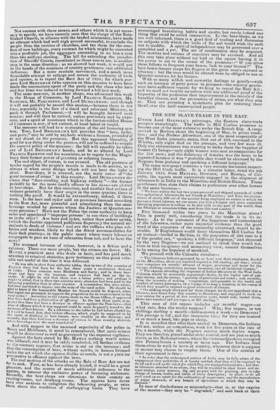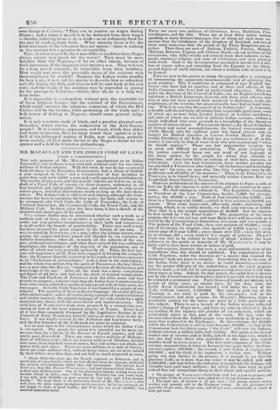THE NEW SLAVE-TRADE IN THE EAST.
lissom Lord GLENELG.S patronage, the Eastern slave-trade prospers exceedingly. The traffic in Hill Coolies promises to
become one of the most extensive under the British flag. A cargo arrived in Berbice about the beginning of May, in prime condi- tion ; and the Berbice Advertiser, one of the most respectable of the West India journals, states, that out of 289, conveyed in the Whitby, only tight died on the passage, and very few were ill. Only one circumstance was wanting to make them the happiest of human (?) beings—only eight women were sent as companions for the 280 men ; and the deficiency of females was the more to be regretted because it was "probable they would be shunned by the Negroes from jealousy and speaking a different language." The same newspaper contains a very curious document respect- ing the Hill Cooly traffic. It is a circular letter, dated the 8th January 1833, from HENLEY, Dowsosr, and Brims. of Cal- cutta, the agents most extensively engaged in the shipment of labourers fr. m India to the Mauritius and British Guiana. These gentlemen thus state their claims to preference over other houses in the some business-
" We have within the last two years procured and shipped upwards of 5,000 free agricultural labourers for our friends at Mauritius; and from the circum- stance of nearly 500 out of the number being employed on estates in which we possess direct Interest, we can assure you that a happier and more contented labouring population is seldom to be met with in any part of the world, than tire Dhargas or mountain tribes, sent front this vast country."
Five thousand within two years to the Mauritius alone ! This is pretty well, considering that the trade is in its in- fancy. As to the statement of the happiness and contentment of the labourers, rather more impartial evidence than the good word of the exporters of the commodity advertised, would be de- sirable. If Englishmen could fancy themselves Hill Coolies for an instant—landed in Berhice, in the proportion of 280 men to 8 of the gentler sex," speaking a diffisrent language," and shunned by the very Negroes—we are inclined to think- they would not, even in that imaginary and momentary view, conceit themselves to be among the happiest of mankind.
We proceed with the Calcutta circular-
" The labourers hitherto procured by us hr ive cast their employers, landed at the Mauritius, about one hundred rupees (or la sterling) per man; wr the hum comprises six months' advance of wages, provisions and water ro
vro age, clothing, commission, passage, insurance, and all incidental charges."
The expense attending the shipment of Indian labourers to the West India Colonies, would he necessarily augmented—firstly, by the higher rate of pas- mage•money, and the increas, quantity of provisions and water ; and, secondly, from the necessity of making . -rangements, indivensable to the health and comfort of native passengers, on a voyage of so long a duration, in the course of which they would he exposed to great vicissitude of climate. "Our waking ample allowance for these charges, we do not apprehend that a labourer, sent direct from this country to Demerary, and engaged to work on your estates for a period of five consecutive years, would cost, landed there, above two hundred and ten rupees, or 211. sterling."
This sum of 210 rupees includes six months' wages—at what rate, does the reader suppose? Why, five rupees, or ten shillings sterling a month—half-a-crown a week—in Demerara! The passage is 101., and the insurance I2s.; for they are insured , at so much a head, like pigs or sheep.
It is manifest that after their arrival in Demerara, the Indians • will not, unless on compulsion, work for live years at the rate of I0s, a month, while the Negroes receive much higher wages.
• They are therefore placed under strict control, and are just as much slaves as the Redemptioners, whoa] (he virtuous Quakers inveigled into Pennsylvania a century or more ago. The Indians bind themselves to work in town or country, wherever their consignee or master may choose to employ them. One of the articles of their agreement is this- " Ira order that the undersigned natives of India may he fully aware of the engagement they undertake, it is hereby notified, that they will be required to do all such work as the oVect f.mr which they are engaged necessitates; awl that, as labourers attached to an estate, they will be required to clear forest and ex- tract timber, carry manure, dig and prepare land for planting, also to take charge of horses, mules, and cattle of every description; in short, to do all such work as an estate for the crdtivation of suyar.earte, and the manufacture of sugar demands, or any branch of agriculture to which they may be destined."
In case of disobedience or misconduct—that is, at the caprice of the master—they may be " degraded," and sent back at their own charge to Cale:Mo.., They are to receive no wages during illness ; and a rupee a month is to be deducted from their wages —thereby reducing them to 2s. a week—as an indemnity-fund for the cost of sending them back. What security there is for the kind treatment of the labourers does not appear : there is nothing in the contract but a premise to act equitably. Now, in what respect do these men differ in condition from Negro slaves, except very much for the worse ? They must be more helpless than the Negroes,—if for no other reason, because of their ignorance of the language their masters use. They will not, for a long period certainly, be formidable from their numbers. How easily may even the miserable terms of the contract with their employers be evaded ! Suppose the Indian works steadily for four years, it may suit his master to describe him as refractory and idle during the fifth, and then he will be sent back at his own cost ; and the whole of his earnings may be expended in paying for his passage to Calewta,—where, after all, he is a long way from home.
It is impossible to contemplate without pain the inevitable lot of these helpless beings : but the conduct of the Government, which could sanction the infamoua commerce of which the Hill Coolies will be the victims, while professing all the while such a holy horror of dealing in Negroes, should rouse general indig- nation.
Is it only a certain shade of black, and a peculiar physical con- formation, which excites the compassion of the Anti-Slavery people? If it is cruelty, oppression, and fraud, which they abhor and desire to prevent, then let them renew their agitation in be- half of the kidnapped natives of India, now suffering, probably more acutely, all that made the lot of the Negro a theme for elo- quence and u field for Christian philanthropy.



























 Previous page
Previous page